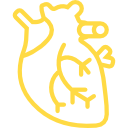BENEFITS OF OMEGA 3
Omega–3 is the most important essential nutrient that our diet lacks. There is now overwhelming evidence that Omega–3 can improve health by lowering triglycerides, improving Heart and Brain functioning, improve circulation and help prevent diseases and ailments such as: Diabetes, Strokes, Depression, Arthritis, Allergies, ADHD, Alzheimer’s, Skin disorders and Gout.
Omega-3 continues to grow in scientific credibility as a key component of health. Established and emerging evidence supports its continued use, providing practitioners with a leading edge as well as safe and effective means to enhance their clinical practice for optimum results.
By incorporating See Yourself Well EPA and DHA into a treatment plan, within 4-6 weeks a patient will:
Reduces
32%
The risk of developing heart disease
Reduces
75%
Risk of death from heart attack
Reduces
75%
Plaque build-up in arteries
Reduce
5
resting heart beats per minute
Reduces
30%
The risk of stroke
Decrease
15%
Cataracts in the elderly
Decrease
35%
Risk of pneumonia
Lowers
32%
Blood TG levels
Other Benefits of Omega 3
- Correct irregular heartbeat
- Decrease in pain symptoms associated with rheumatoid general joint aches and pains
- Decrease in inflammatory biomarkers associated with liver disease
- Decrease in breathing problems such as asthma and bronchial constriction
OMEGA 3 HELPFUL FOR

HEART
Clinical studies conclude that by maintaining the correct amount of Omega-3 (DHA & EPA from fish oil ) in your body you are 32% less likely to develop heart disease*, and you are 70% less likely to die from a heart attack**.

BRAIN
Clinical research continues to document that, from the womb, and throughout one’s lifecycle, the proper levels of Omega-3 provide great benefits to brain function and eyes, and assist in the prevention of illnesses like Alzheimer’s disease and depression.

CANCER
It has been clinically proven that those suffering from cancer are more susceptible to heart disease, weakened immune response, and other related inflammatory conditions. These conditions are positively impacted by Omega-3 EPA and DHA.

INFLAMMATION
Immune system and inflammatory response helps the body defend and heal itself. But the immune system’s response must be balanced, managing the inflammatory response to prevent injury normal and otherwise healthy tissue. Omega-3 EPA and DHA from fish and fish oils can help.
OVERALL RECOMMENDED DAILY DOSAGE LEVELS*
- Minimum Daily Requirement: 500 mg EPA & DHA
- Preventive Support: 900 mg EPA & DHA
- Blood Triglyceride-Lowering: 2000-3000 mg EPA & DHA
- Pregnancy and Lactation: 200-300 mg DHA
- Children ages 1-8 years of age: 100-1500 mg EPA & DHA
- Adolescents ages 9-13 years of age: 100-2000 mg EPA & DHA
- Adolescents ages 14-18 years of age: 100-2500 mg EPA & DHA
SEE YOURSELF WELL OMEGA-3 FISH OILS
- Support cardiovascular health
- Reduce serum triglyceride levels
- Support cognitive health and brain function
- Toxin Free | Pharmaceutical-Grade & Ultra-Refined
- Purity & Potency Guaranteed | 5 Star Rating by IFOS
- Rapidly-Absorbed | Natural Triglycerides Formula
References
* Simon et al., Serum fatty acids and the risk of coronary heart disease. Am. J. Epidemiol. 142:469-476 (1995). ** Lemaitre et al., n-3 Polyunsaturated fatty acids, fatal ischemic heart disease, and nonfatal myocardial infarction in older adults: the Cardiovascular Health Study. Am. J. Clin. Nutr. 77:319-325 (2003)
- Berbert et ai, J. Of nutr., London State Univ. Brazil, 2005.
- Lopez-Garica et. AI., J. Nutr., 134: 1806-1811, 2004.
- Merchant et aI., AJCN., 82- 668-674, 2005.
- Lu et aI., Am. J. Epid., 161:948-959,2005.
- Miljanoiv et aI., AJCN. 82:887-893,2005.
- Mickleborough et al. Am J. Respir. Crit. Care Med., 2003.
- Peat et aI., J. Allergy Clin Immunology, 114(4):807813, 2004.
- Proc Natl Acad Sci USA. 2005 May 17;102(20):7133-8. Epub 2005 May 9.
- A. Richardson and P. Montgomery, Pediatrics, 115: 1360-1366, 2005.
- Yuen et aI., Epilepsy and Behaviour, 7:253-258, 2005.
- Whalley, et aI., AJCN, 80: 1650-1657, 2004.
- Hibbeln, NIH, 2005. Br J Cancer. 2003 Nov 3;89(9):1686-92.
- Augustsson et aI., Cancer Epid., Biomarkers, and Prev., 12: 64-67, 2003.
- Norat et aI., J. Natl. Cancer Inst., 97:906-16, 2005.
- Simon et ai, AJE, 1995, also AHA Statement, 2000.
- A.M. Gotto, Circ. 97:1027, 1998.
- Billman, GE, Proc. Natl. Acad. Sci. 1994.
- LeMaitre et aI., AJCN, 77:319, 2003.
- He et aI., Stroke, 35: 1358-1542, 2004.
- Holub BJ., CMAJ, 166:609-615, 2002.
